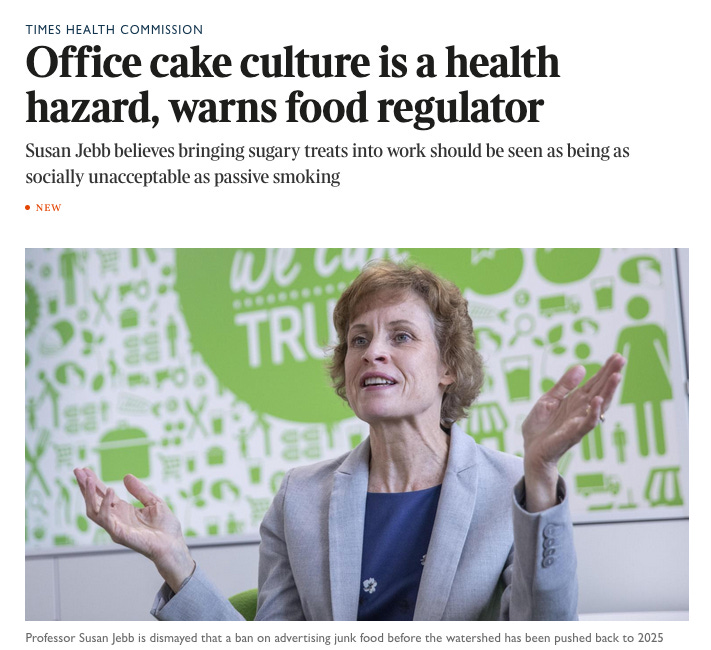“If nobody brought in cakes into the office, I would not eat cakes in the day, but because people do bring cakes in, I eat them.”
It is none other than the head of the Food Standards Agency, Susan Jebb, who is in The Times tomorrow comparing cakes to passive smoking.
“We all like to think we’re rational, intelligent, educated people who make informed choices the whole time and we undervalue the impact of the environment,” she said. “If nobody brought in cakes into the office, I would not eat cakes in the day, but because people do bring cakes in, I eat them. Now, OK, I have made a choice, but people were making a choice to go into a smoky pub.”
While saying the two issues were not identical, Jebb argued that passive smoking inflicted harm on others “and exactly the same is true of food”.
Jebb told The Times that advertising of junk food was “undermining people’s free will” and insisted restrictions were “not about the nanny state”.
“Advertising means that the businesses with the most money have the biggest influence on people’s behaviour. That’s not fair.”
“At the moment we allow advertising for commercial gain…
…with no health controls on it whatsoever and we’ve ended up with a complete market failure because what you get advertised is chocolate and not cauliflower.”
And yes, Susan, making it illegal for food companies to tell consumers about their products is ‘nanny state’. And no, what you’re describing is not a ‘market failure’.
Apparently, Jebb is on The Times Health Commission because of course she is. I must admit that I didn’t know she’s also been running the Food Standards Agency since 2021. I am familiar with her mainly as an activist-academic who keeps getting taxpayer-funded jobs, so I can’t say I’m shocked to hear that she’s ended up in charge of a bloated, Blair-era government agency that never needed to be created in the first place and has long since deviated from its original purpose to become a soapbox for the paternalist elite.
Public choice theory provides a plausible explanation for why governments fail to deliver what is expected of them, both in terms of public services (which are hampered by bureaucratic inefficiency) and legislation (which is hijacked by special interests). It explains why bureaucracies become ever more bloated and taxes rise ever higher, even under governments which come to power on a ticket of deregulation and smaller government. It explains why bureaucracies are so resistant to budget cuts and why it tends to be frontline services, rather than management, which bear the brunt of such cuts if and when they arrive. It explains why an organisation like the Food Standards Agency can go from having a tiny staff investigating restaurant poisonings to having a staff of 2,000, a budget of £135 million and a mission that has expanded to campaigning against salt, fat and eating crisps during football matches.
When the Conservatives once again find themselves languishing in opposition, I suspect that quite a few of them will ask themselves exactly that.


No comments:
Post a Comment